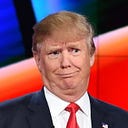Day 833: No vetting: Trump’s nomination process is deeply flawed
If you find yourself writing a favorable column about Donald Trump or bumping into him on the golf course, you may be nominated to a top government post, it seems.
No matter their qualifications or the job sought, Trump nominates people with questionable backgrounds. The total lack of vetting has caused Trump’s nominees to withdraw at more than twice the rate of Barack Obama’s nominees at the same point of each presidency. This despite a Republican-controlled Senate that only needs a simple majority to confirm a nominee.
The latest casualty is Stephen Moore, Trump’s latest pick to serve on the Federal Reserve Board, who was surprised his previous writings were being scrutinized. The White House didn’t bother doing much due diligence into Moore’s past before thrusting him forward.
Past administrations have historically spent weeks or even months trying to identify potentially damaging information about candidates for administration jobs — long before their nominations are announced. Yet Trump’s White House again appeared to neglect the basic vetting that has for decades been the cornerstone of the nomination process.
“What went wrong here was the vetting process,” Moore acknowledged during Thursday’s interview.
Indeed, many in the administration were unaware of some of Moore’s past writings, according to a person familiar with the matter.
The White House vetting problem is true for a variety of positions: economic, judicial and even national security. The lack of vetting exists for hugely important positions, such as Cabinet members, and for slightly lesser positions, like board members. On top of that, dozens of senior positions in departments of State, Justice and Defense remain open because Trump won’t nominate anyone at all.
And while Moore’s nomination isn’t going forward, for statistical purposes, it won’t even count as a formal withdrawal.
In total, Trump has withdrawn 62 nominees since taking office, according to data provided to POLITICO by the Partnership for Public Service, a nonprofit that tracks federal vacancies. At this point in his presidency, Barack Obama had withdrawn 30 nominees. The figures include only people who were formally nominated, so Moore and others who took themselves out of consideration before their official paperwork was sent to the Senate aren’t counted.
While the White House has certainly dropped the ball, Trump’s own free-wheeling has made the problem so much worse.
Current and former administration officials insist that they’ve made strides in professionalizing the White House’s internal vetting operation. But they say the president himself sometimes undermines that process by making major staffing decisions on his own, with little consultation and with little notice.
“He’s impatient and impulsive,” a former senior White House official said. “When he makes a decision, he wants to move forward. There aren’t any people around him urging caution.”
“It’s been a steady march toward an unrestrained president,” the former official said. “We’ve now reached the complete extreme of the spectrum in which the president is deciding something in private based on the recommendations of one or two people.”
Increasingly — seemingly, impossibly — the government is being staffed by whoever happens to know Trump, regardless of qualifications and experience. After more than two years on the job, Trump seems to understand less about vetting and staffing than he did at the outset of his presidency.
833 days in, 629 to go
Follow us on Twitter at @TrumpTimer
